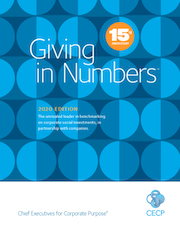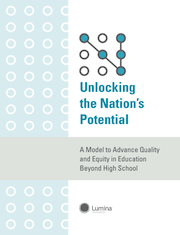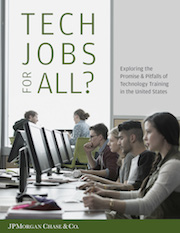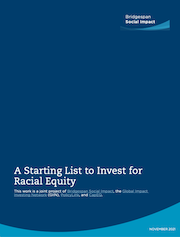Site Search
- resource provided by the Forum Network Knowledgebase.
Search Tip: Search with " " to find exact matches.

CECP’s Giving in Numbers™is the unrivaled leader in benchmarking on corporate social investments, in partnership with companies. It is the premier industry survey and research, providing standard-setting criteria in a go-to guide that has defined the field and advanced the movement. CECP has the largest and most historical data set on trends in the industry, shared by more than 585 multi-billion-dollar companies over nearly 19 years, representing more than $312 billion in corporate social investments over that time span. The report is embraced by professionals across all sectors globally to understand how corporations invest in society, with topics ranging from cash and in-kind/product, employee volunteerism and giving, and impact measurement.


Join Grantmakers Concerned with Immigrants and Refugees (GCIR) for a conversation with Norma on visionary strategy, collective practice, and what leaps we need to make in a time of maximum fear.
In her book, When No Thing Works: A Zen and Indigenous Perspective on Resilience, Shared Purpose, and Leadership in the Timeplace of Collapse, Zen master and Indigenous Hawaiian leader Norma Wong describes this time as an era of collective acceleration, where the swiftly moving current, fed and shaped by human actions, sweeps us toward ever uncertain futures. In her book and in her work, Norma invites us not only to imagine, but to live into, a story beyond crisis and collapse.
Registration:
There is no cost for this webinar.
You will need to log in or create an account on GCIR's website to register for this program.

This work is a joint project of Bridgespan Social Impact, the Global Impact Investing Network (GIIN), PolicyLink, and CapEQ.
Since the social unrest over racial injustice in the summer of 2020, philanthropists, corporations, and impact investors across the United States pledged to invest billions of dollars to advance racial equity. However, recent scrutiny of those commitments reveals that the majority of those dollars remain on the sidelines.
A common hypothesis for the shortfall is the lack of investable “shovel-ready” opportunities. But Bridgespan Social Impact has formally and informally advised organizations seeking to invest for racial equity over the years, and found that hypothesis to be patently untrue. To make the case, Bridgespan is publishing this list of racial-equity funds that emerged from our experience, at the request of multiple funds and potential investors, and alongside the launch of a new racial-equity theme in the IRIS+ family of impact measurement and management guides. It comprises more than 160 funds that explicitly seek to improve the livelihoods of individuals who are Black, Indigenous, and people of color (BIPOC) and their communities. And we’re not done yet.
What is racial-equity investing?
In putting together this list, we chose to characterize “racial-equity investing” as directing capital toward creating equitable opportunities for BIPOC individuals and communities. That often requires shifting decision-making power and redefining risk so that capital flows more freely in service of those opportunities.
Sourcing these funds, we uncovered dozens of creative financing vehicles aimed at building power, creating economic opportunity, and improving livelihoods for communities of color.
The Office of the Governor has taken extraordinary steps to mitigate the spread of the coronavirus and protect the health and well-being of New Jerseyans. Among the Governor’s executive orders includes the creation of the State Coronavirus Task Force, closing schools and issuing a shelter-in-place directive. While these orders are paramount and designed to ensure the overall health of our state’s residents, they are impacting our communities. This includes the need for services such as emergency childcare, tax relief, extra SNAP benefits, additional resources for unemployed workers and small businesses, housing and rental assistance, and increased support for healthcare workers.
Join Deborah Cornavaca, Deputy Chief of Staff for Outreach to Governor Murphy, for an overview of how the administration is addressing a range of numerous and complex issues related to mitigation, protecting our state’s most vulnerable, and working with partners on-the-ground. This discussion will help us understand the range of unmet needs and other services that will be filled by nonprofits, identify possible opportunities for the philanthropic community to collaborate with state government, and how the overall social sector might better utilize resources and tools during these unprecedented times.
Learn how funders and grantees can help fill gaps, keep people informed as trusted community partners, and share insights on the most critical needs facing the state.
Cost: Free for CNJG Members and Nonmember Grantmakers
This program is open to Grantmakers only.
Webinar Video
Bank of America has announced grants totaling more than $22 million in support of advancing racial equality and economic opportunities.
A total of $18.35 million was awarded in support of higher education and workforce development, with a focus on efforts to strengthen hiring pipelines and empower students to advance their academic and career opportunities, including a previously announced $10 million grant to Spelman and Morehouse colleges to establish the Center for Black Entrepreneurship. Workforce development awards include $300,000 to GRID Alternatives in support of the SolarCorps Fellowship Program, which enables individuals from diverse backgrounds to be trained and launch careers in the renewable energy field, as well as grants to the Thurgood Marshall College Fund, Posse Foundation, Hispanic Scholarship Fund, and United National Indian Tribal Youth.
In addition, $1.3 million was awarded to assist minority and indigenous entrepreneurs and their small businesses through organizations such as the Latino Business Action Network, Echoing Green, and Our Native American Business Entrepreneurship Network (ONABEN), and $2.55 million was awarded in support of health and emergency needs, such as hunger relief and shelter focused on helping communities recover from the disproportionate impact of the coronavirus including Hispanic-Latino community-based health organizations that are part of the UnidosUS community health affiliate network and the Hispanic Federation.
"Workforce development, job creation, and access to health and housing services are some of the most pressing needs facing Black, Hispanic-Latino, and Native American individuals," said Ebony Thomas, Bank of America's racial equality and economic opportunity executive. "By providing this support alongside our national and local partners, we are further addressing many of the challenges facing under-resourced and underserved communities across the U.S."
Americares has announced a $2 million grant from Johnson & Johnson to launch a three-year program aimed at strengthening the resilience of more than 100 safety-net health clinics in areas where climate change disproportionately affects the health of vulnerable communities.
The Climate Health Equity for Community Clinics Program is a collaborative effort between Americares, the Center for Climate, Health and the Global Environment (C-CHANGE) at the Harvard T.H. Chan School of Public Health, Johnson & Johnson, and healthcare providers at participating free clinics and community health centers, which will design tailored interventions that meet the needs of under-resourced and overworked staff. By improving clinic operations and health resilience, the program aims to protect patients’ health during heat waves, wildfires, hurricanes, floods, and other climate-related emergencies.
According to Americares, more than 90 percent of free clinic and community health center patients qualify as low income, and more than half identify as racial and ethnic minorities. The World Health Organization has declared climate change the single biggest threat to humanity—putting clean air, safe drinking water, secure housing, and food supplies at risk—and projects climate change will cause an additional 250,000 global deaths annually from 2030 to 2050, largely due to malnutrition, malaria, diarrhea, and heat stress.
TD Charitable Foundation on Monday said it awarded a total of $7 million to 37 nonprofits across the bank’s footprint through the 17th annual Housing for Everyone grant program.
According to the charitable giving arm of Cherry Hill-based TD Bank, “America’s Most Convenient Bank,” grants ranging from $150,000 to $250,000 will support organizations that work to deliver rental assistance, rehabilitate affordable rental housing properties and build organizational capacity to address resident sustainability for the long-term.
As individuals and families across the country struggle with inflation and an exponential rise in rental costs, affordable housing providers face increased hardship, given the growing demand for affordable rental units and emergency rental assistance.
“The affordable housing crisis continues to burden the most vulnerable members of our communities and the organizations committed to supporting them,” Paige Carlson-Heim, director of the TD Charitable Foundation, said. “At TD, we’re committed to doing our part to help create a more sustainable and inclusive future for everyone, and that includes providing access to safe, affordable homes. This year’s grant recipients are mission-critical to that work, and the TD Charitable Foundation is proud to support them in their efforts to create a positive impact and a pathway to housing stability in the communities we serve.”
The Montclair Foundation is proud to announce the awarding of $90,000 in grants to 17 local nonprofit organizations through its Spring 2025 grant cycle. These grants will support critical initiatives in the areas of Education, Community Service and Cultural Arts — continuing the Foundation’s long-standing commitment to nurturing and strengthening the greater Montclair community.
Thanks to the success of the Foundation’s recent capital campaign, this grant cycle includes several larger awards and a multi-year grant, reflecting an exciting new chapter of expanded community investment.
“We are incredibly grateful to our donors and supporters whose generosity through our capital campaign has allowed us to increase both the scope and impact of our grantmaking,” said Peggy Deehan, Chair of the Grants Committee. “Montclair is home to so many extraordinary organizations making a meaningful difference every day. It’s a privilege to partner with them in creating a more vibrant, inclusive, and compassionate community.”
This season’s recipients include organizations providing emergency medical services, youth tutoring and mentoring, early childhood care, community wellness, arts education, and cultural programming. Among the highlights is a multi-year grant to Imani — the inaugural recipient of the newly established Emer Featherstone Education Grant, named in honor of our esteemed past Board Chair - and a $15,000 grant to the Montclair Ambulance Unit to support a critical outreach campaign. The Foundation extends its sincere appreciation to all applicants for their dedication and invaluable work in the community.
The New Jersey Council for the Humanities (NJCH) recently awarded $199,637 in Incubation and Action Grant funding to sixteen organizations. Incubation Grants help organizations plan, research, develop, and prototype public humanities projects and events. Action Grants help organizations implement a wide array of humanities-based projects, including public programs, exhibitions, installations, tours, and discussion groups.<BR><BR>
Public humanities programming allows individuals to engage in lifelong learning and share in the exploration of history, values, cultures, and beliefs. NJCH supports and acts as a resource for cultural and service-oriented nonprofit partners as they bring the public humanities to the residents of New Jersey, harnessing the power of the humanities to strengthen communities.
Looking to help drive economic opportunity and upward mobility, Bank of America announced Tuesday that it will be making more than $4.2 million in grants to 75 New Jersey nonprofits.
The grants, announced during “Giving Tuesday,” will be used by groups that focus on basic needs, affordable housing, workforce development and small business and economic revitalization, Bank of America New Jersey President Alberto Garofalo said.
“As part of our commitment to sustainable growth, helping local organizations address immediate short- and long-term needs has been key on our path of economic recovery,” he said. “By supporting New Jersey’s incredible network of nonprofits, Bank of America is providing philanthropic capital to help advance economic and social progress, establishing pathways to success and stability for our community.”
The New Jersey Council for the Humanities (NJCH) has announced $272,408 in grant funding to 22 organizations across the state for Spring 2023.
The awards are split between 11 Incubation Grants and 11 Action Grants. Incubation Grants help organizations plan, research, develop, and prototype public humanities projects and events. Action Grants help organizations implement a wide array of humanities-based projects, including public programs, exhibitions, installations, tours and discussion groups.
“This grant funding represents support for a mixture of new projects and ongoing, important work,” said Carin Berkowitz, Ph.D., executive director of NJCH. “In that way, it mirrors the fundamental purpose of the humanities, examining our history and culture in ways that shape our current understanding of the world.”
